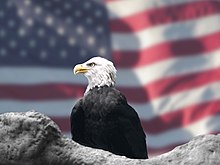James Truslow Adams
Appearance


James Truslow Adams (October 18, 1878 – May 18, 1949) was an American writer and historian.
| This article on an author is a stub. You can help out with Wikiquote by expanding it! |
Quotes
[edit]- There are obviously two educations. One should teach us how to make a living and the other how to live. Surely these should never be confused in the mind of any man who has the slightest inkling of what culture is. For most of us it is essential that we should make a living...In the complications of modern life and with our increased accumulation of knowledge, it doubtless helps greatly to compress some years of experience into far fewer years by studying for a particular trade or profession in an institution; but that fact should not blind us to another—namely, that in so doing we are learning a trade or a profession, but are not getting a liberal education as human beings.
- To "Be" or to "DO" Forum, Jun 1929; VOL. LXXXI, NO. 6
- As we look over the list of the early leaders of the republic, Washington, John Adams, Hamilton, and others, we discern that they were all men who insisted upon being themselves and who refused to truckle to the people. With each succeeding generation, the growing demand of the people that its elective officials shall not lead but merely register the popular will has steadily undermined the independence of those who derive their power from popular election. The persistent refusal of the Adamses to sacrifice the integrity of their own intellectual and moral standards and values for the sake of winning public office or popular favor is another of the measuring rods by which we may measure the divergence of American life from its starting point.
- The Adams Family, p. 95 (1930)
- It may be that without a vision men shall die. It is no less true that, without hard practical sense, they shall also die. Without Jefferson the new nation might have lost its soul. Without Hamilton it would assuredly have been killed in body.
- Jeffersonian Principles and Hamiltonian Principles, p. xvii (1932)
- If, as I have said, the things already listed were all we had had to contribute, America would have made no distinctive and unique gift to mankind. But there has been also the American dream, that dream of a land in which life should be better and richer and fuller for every man, with opportunity for each according to ability or achievement. It is a difficult dream for the European upper classes to interpret adequately, and too many of us ourselves have grown weary and mistrustful of it. It is not a dream of motor cars and high wages merely, but a dream of social order in which each man and each woman shall be able to attain to the fullest stature of which they are innately capable, and be recognized by others for what they are, regardless of the fortuitous circumstances of birth or position.
- Adams first coined the phrase [1] "the American dream" in The Epic of America (2nd ed., Greenwood Press, 1931), p. 404
- The American dream that has lured tens of millions of all nations to our shores in the past century has not been a dream of material plenty, though that has doubtlessly counted heavily. It has been a dream of being able to grow to fullest development as a man and woman, unhampered by the barriers which had slowly been erected in the older civilizations, unrepressed by social orders which had developed for the benefit of classes rather than for the simple human being of any and every class.
- The Epic of America (2nd ed., Greenwood Press, 1931), p. 405
- If the American dream is to come true and to abide with us, it will, at bottom, depend on the people themselves. If we are to achieve a richer and fuller life for all, they have got to know what such an achievement implies. In a modern industrial State, an economic base is essential for all. We point with pride to our "national income," but the nation is only an aggregate of individual men and women, and when we turn from the single figure of total income to the incomes of individuals, we find there was a very marked injustice in its distribution. There is no reason why wealth, which is a social product, should not be more equitably controlled and distributed in the interests of society.
- The Epic of America (1931), p. 410 [2]


